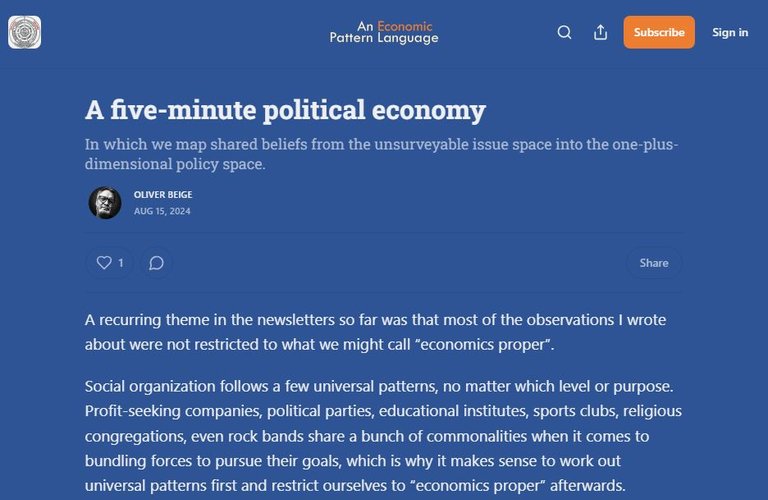The latest article from Dr. Oliver Beige is as insightful and razor-sharp as always. In the optimistically-named "A five-minute political economy", he addresses a fundamental question:
how we take the preferences, beliefs, dispositions, moral frameworks of a diverse group of people and aggregate them in a way that we achieve something we can fuzzily enough describe as “common progress”.

Or, even more clearly put:
how do we resolve the conflict between moving forward and staying together if everyone has a different idea what “forward” is.
One remarkable insight of the paper is the specificity of politics, posited decades ago by political scientist Philip Converse: people's beliefs tend to "cluster" and radically reduce the number of dimensions of the political space: the enduring significance in politics of the famous "left" vs. "right" or "progressive" vs. "conservatives" dichotomy is testimony to it.
More precisely, it turns out politics is mostly "one-plus-dimensional":
A second dimension adds a bit, the third and any higher dimension almost nothing at all.
Politics is then typically “one-plus-dimensional”, except when we encounter upheavals, when existing coalitions (belief clusters) break up and form anew. That's when the second dimension becomes more prominent.
This is all the more interesting as outside of politics, collective preferences for clothes, music, or cars are scattered in high-dimensional spaces with significantly lower predictability.
Against this backdrop, Oliver observes that most of the institutions we still use today were built a few centuries ago, when representatives "took days riding on horseback from the capital to their constituency, and news traveled just as slowly." So the natural question that comes up is: in the era of lightning fast communication, can we provide a better solution to the "moving forward while staying together" problem - id est "enabling long-term progress for the whole commonwealth while keeping inner peace" by designing a more direct democracy, "aggregating the will of the people in real time", and dis-aggregating it "down to each individual issue", or organizing "an ongoing supervision model where representatives can be voted-off any time?"
His hunch is that the answer is negative, because the institutions we rely on were designed primarily to bridge the "much longer time frame of the collective deliberation process we might call “forming belief clusters”." And also because the currency of the economy, "money", proved time and again to be a poor match for the currency of politics, "the vote".
Out of this picture emerges a justification for the modern "nation state", where the "nation" provides "a shared belief structure" and the "state" administers all involuntary exchange within that belief structure, namely "all exchange that requires coercion or physical force."
These reflections hold powerful insights for any attempts at building incentive-driven, blockchain-supported "virtual countries". Functioning economies - administering voluntary exchange - can be devised using decentralized crypto currencies. People can come together around novel belief systems. But an issue remains to be addressed - who to cast in the role of the "bureaucracy that administers all involuntary exchanges"?
